These days we hear a lot about the demise of print publication and the general plight of the publishing world. But many agree that there will always remain an interest in local news and therefore local newspapers. The Newtowner is essentially local literary news for Newtown, Connecticut. For those engaged in the world of Arts and Literature, having a publication like this available to your community is something of a dream come true. After all, who wouldn’t subscribe to a magazine highlighting the local goings-on pertaining to your niche area of interest? Continue reading “The Newtowner – Summer 2011”
NewPages Blog
At the NewPages Blog readers and writers can catch up with their favorite literary and alternative magazines, independent and university presses, creative writing programs, and writing and literary events. Find new books, new issue announcements, contest winners, and so much more!
The Newtowner – Summer 2011
Spread the word!
Plain Spoke – Spring 2011
I was immediately drawn to Plain Spoke. Poetry in plain language, I thought. Yeah, there we go. The subtitle only made it better: A Literary Speakeasy. Oh yeah. My kind of language in my kind of place. I imagined straight, honest poetry like bourbon served neat in a drinking glass—edgy, not quite legit. I couldn’t wait to get started. Continue reading “Plain Spoke – Spring 2011”
Spread the word!
River Styx – 2011
Circles of Hell: think Dante’s ancient classic? This themed issue of River Styx examines, analyzes, and explicates the idea of hell both as a place and metaphor. The writers are creative, funny, and at times undeniably enthralling. Continue reading “River Styx – 2011”
Spread the word!
Sinister Wisdom – Spring 2011
The title intrigued me. As I took my Pandora-esque peek between the pages of Sinister Wisdom, I was caught in a whirlwind of shadows, hope, despair, courage and fire. There is no complacency here, folks, so if that’s what you came for, you’ve come to the wrong place. These essays, poetry and art by lesbians who experienced the “coming out” times of the 60’s and 70’s force the reader’s eyes open, shines a light into them—a light that is sometimes too bright, too painful. You want to look away, but don’t. There is much here that you should not miss. Continue reading “Sinister Wisdom – Spring 2011”
Spread the word!
Three Coyotes – Winter/Spring 2011
Joan Fox’s Editor’s Note, entitled “Variety and Vision,” states that this inaugural issue “features poems of survival, defiance and hope; images of our Western landscape; and, works offering a world of beings—mountain lions, coyotes, doves, dragonflies, cockroaches, fleas, cats, dogs, pelicans, humans, machines, sunlight.” Indeed, Three Coyotes highlights the beauty of the natural world, whether it is through the medium of prose, poetry, or photography. Continue reading “Three Coyotes – Winter/Spring 2011”
Spread the word!
Versal – 2011
The latest issue of Versal establishes its strong character before you even open it up. Simply styled with Antoinette Nausikaä’s cover art, it states in black handwriting “I AM HAPPY” (followed by the date and location of the statement’s creation). There it is. A negation of the bland and normal, an embracing of the strangeness of human existence. Part of the cover’s beauty comes from its confidence—isn’t it a bit more difficult, a bit more unnerving to say simply, “I am”? It allows for the possibility of any (or no) emotion, any description, and in that sense it is universal. Fitting, since the journal prides itself on its trans locality, based in Amsterdam but spanning across nations. At the same time, however, the statement is personal, almost forceful. Continue reading “Versal – 2011”
Spread the word!
Weave Magazine – 2011
When I received my stack of magazines to review this month, Weave felt the best in my hands. It’s a smaller journal, thin and light-weight, but that’s not all that separates it from “the big boys.” Weave opens its sixth issue with a stitched in supplement called The Clothesline. Here’s what founding editor Laura E. Davis has to say about it: Continue reading “Weave Magazine – 2011”
Spread the word!
Willow Springs – Fall 2011
Willow Springs Issue 68 is a meal. Maybe a sandwich. But maybe that metaphor is too old. Let’s say lasagna, poetry stuffed between layers of prose, topped with a melted interview. Willow Springs fills you up with poems by Dexter L. Booth, Beckian Fritz Goldberg, and Nance Van Winckel among many others, prose from Clare Beams, Kirsten Sundberg Lunstrum, Jill Christman, and Sarah Hulse, and a conversation with Richard Russo. Continue reading “Willow Springs – Fall 2011”
Spread the word!
The Worcester Review – 2010
The Worcester Review (published and edited out of Worcester, Massachusetts) is a bit of a rare bird, regularly combining a “regional” focus with a “Feature Section” on a particular poet of interest with Worcester area ties. This latest issue is a definite delight for readers interested in the poet Charles Olson. While this is not the only worthwhile aspect, it remains the key element which lifts the whole of The Worcester Review above the fray distinguishing it from similar literary reviews published this last year. Continue reading “The Worcester Review – 2010”
Spread the word!
LILIPOH – Summer 2011
I was filled with both excitement and apprehension when I received my Summer 2011 issue of Lilipoh in the mail. This issue is entitled “When Disaster Strikes,” and the words “Radiation,” “Anxiety,” and “Emergency” jumped off the cover at me. As someone who feels particularly in-tune with many of the natural and man-made disasters that have occurred around the world in recent years, and as someone who feels a bit of trepidation when I ponder the future my generation appears to be leaving for our children, I already have more than my share of anxiety. However, I was reassured by what I found inside this magazine—a common perspective and some tips for helping to change our current course. Continue reading “LILIPOH – Summer 2011”
Spread the word!
New Lit on the Block :: West Marin Review
 West Marin Review is a literary and art journal published by “a dedicated band of volunteers supported by two local literary interests – the Tomales Bay Library Association and Point Reyes Books – and friends and neighbors.” And while this grounds the review in local support, contributions are open to all writers and artists, newcomers as well as professionals.
West Marin Review is a literary and art journal published by “a dedicated band of volunteers supported by two local literary interests – the Tomales Bay Library Association and Point Reyes Books – and friends and neighbors.” And while this grounds the review in local support, contributions are open to all writers and artists, newcomers as well as professionals.
A full table of contents for each issue is available online. Issue three offers excerpts of some content online. The print issue includes:
Prose by Catherine David, Reynold Junker, Jessica O’Dwyer, Agustina Martinez, Jan Harper Haines, Agnes Wolohan Smuda von Burkleo, Vivian Olds, Elia Haworth, Jonathan Rowe, Steve Heilig, Daniel Potts, Flor Jimenez, Jazmine Collazo, Cynthia A. Cady, Jody Farrell, Dave Mitchell, and Terry Nordbye;
Poetry by Jodie Appell, Prartho Sereno, Julia Bartlett, Gillian Wegener, Juan Avalos, Albert Flynn DeSilver, Lynne Knight, Apology, Randall Potts, Hal Ober, Roy Mash, and Nellie Hill;
Art + Artifact by Patti Trimble, Nell Melcher, Ryan Giammona, Andrzej Michael Karwacki, Amanda Tomlin, Kurt Lai, Jessica Baldwin, Willow Wallof, Sha Sha Higby, Marnie Spencer, Terrence Murphy, Christa Burgoyne, Wendy Goldberg, Dewey Livingston, Tom Killion, Richard Lindenberg, Lorna Stevens, Kevin Alvarado, Jacqueline Mallegni, Christa Coy, Kyla Pasternak, Mary Siedman, Zea Morvitz, Vi©kisa, Jon Langdon, Mark Ropers, Sevilla Granger, and Mardi Wood.
Spread the word!
Asian American Literary Review 9/11 Issue
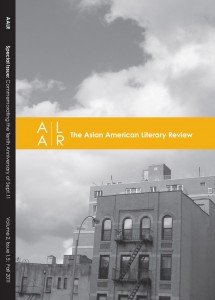 The Asian American Literary Review, Fall 2011 is a special issue commemorating the tenth anniversary of Sept. 11. It includes a DVD: “Ten Years Later: Asian American Performers Reflect on 9/11.” A full table of contents is available on the magazine’s website.
The Asian American Literary Review, Fall 2011 is a special issue commemorating the tenth anniversary of Sept. 11. It includes a DVD: “Ten Years Later: Asian American Performers Reflect on 9/11.” A full table of contents is available on the magazine’s website.
Spread the word!
Prairie Schooner New Editor
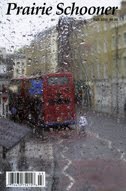 The Fall 2011 issue of Prairie Schooner welcomes Kwame Dawes as the new editor in chief. Dawes joins the University of Nebraska as Glenna Luschei Editor of Prairie Schooner and Chancellor’s Professor of English.
The Fall 2011 issue of Prairie Schooner welcomes Kwame Dawes as the new editor in chief. Dawes joins the University of Nebraska as Glenna Luschei Editor of Prairie Schooner and Chancellor’s Professor of English.
Spread the word!
Students Can Create Daily Comix Diaries to Show What They Learn
From Bill Zimmerman, Creator, MakeBeliefsComix.com – and adaptable to college as well as K-12:
If you’re looking for an exciting new literacy activity for the new school year why not start a daily 20-minute comic strip segment during which your students create a comic diary about something they learned or read or experienced that day? Creating such daily comix diaries provides a way for youngsters to digest and integrate key material that they are taught as well as to reflect on their lives and experiences. And what better way to improve writing, reading and storytelling skills!
To help educators, MakeBeliefsComix.com, the free online comic strip generator, has launched a Daily Comix Diary Page offering many ideas at
http://www.makebeliefscomix.com/Daily-Comix-Diary/
Students can also draw their own comics with pencil or crayons and use stick figures or pictures cut from magazines. By making their own comic strips, students will realize that they can create stories and make art. They will learn that they, too, are capable of generating their own learning materials, their own memoirs, and that their ”take” on the world is so very special – everyone sees things differently.
What to draw and write about?
For starters, why not have students create autobiographical comic strips about themselves and their families or summarizing the most important things about their lives? Let each student select a cartoon character as a surrogate to represent him or her. They might also summarize what their individual interests are or some key moments in their lives.
• Maybe students create a comic strip with a new ending for a book that they’ve read, or an extension of the story, or a deeper exploration of a character in the book.
• Maybe their comic is about a concept they learned in science or in social studies.
• Maybe their comic captures an interesting conversation they overheard.
• Maybe their comic is about something sad or bad that happened to them, such as someone bullying them. Or about something special, such as a birthday wish.
• Maybe their comic is about something fun or wonderful that they or a friend experienced – perhaps an adventure they had. Or, about a great or important memory they will never forget.
• Maybe their daily comic contains a joke they heard or something funny a parent said to them recently.
• Maybe they’re exploring a problem at home that’s bothering them, such as a sibling who’s driving them crazy.
• Maybe theirs is a comic strip utilizing new vocabulary learned that day.
• Maybe their comic strip is a fantasy story that came to their imagination.
• Or, how about creating a political comic strip commenting on some new development in government or a news event?
Now, imagine the student’s comic-filled sketch book or folder containing daily diary entries created over the course of a year that will trace each child’s thoughts and learning, that will reflect what was important to her or him. They’ll have composed a comic book diary that they will treasure for the rest of their lives.
Most important, the 20-minute-a-day daily comix diary challenge offers students the chance to become creators as they find their voice, rather than just passive learners. What better gift can you give them?
Spread the word!
New Lit on the Block :: Poecology
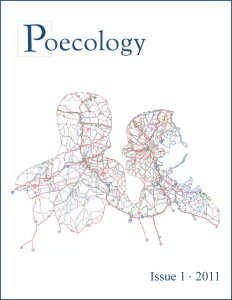 The name Poecology is “the fusion of poetry and ecology brings two of my great passions together” writes editor Kristi Moos. Born from “a slip of the tongue,” Poecology is now an online literary magazine of ecology-focused poetry, fiction, and nonfiction. Moos says, “I think there is much left to be said about the idea that poetry, and all writing for that matter, can influence physical ecology. When the idea for Poecology came about, I started seeking answers to long-held questions: How can literature shape the places and environments that inspire writing in the first place? What can I do to take part?” Issue 1 is just the beginning of the answer to these questions.
The name Poecology is “the fusion of poetry and ecology brings two of my great passions together” writes editor Kristi Moos. Born from “a slip of the tongue,” Poecology is now an online literary magazine of ecology-focused poetry, fiction, and nonfiction. Moos says, “I think there is much left to be said about the idea that poetry, and all writing for that matter, can influence physical ecology. When the idea for Poecology came about, I started seeking answers to long-held questions: How can literature shape the places and environments that inspire writing in the first place? What can I do to take part?” Issue 1 is just the beginning of the answer to these questions.
Contributors to the first issue include Anna L
Spread the word!
Interview with Matt Bell
Art is important. Art isn’t an extra for society, it’s something we have to have. When you edit a magazine or edit a press, if you’re good to the people who submit to you and you’re good to your contributors, and if when you edit, your goal is to help them not only make this piece great, but help them be a better writer down the road—because that’s what people did for us—then maybe those things are making the world better.
Spread the word!
Postcard Publications: Thumbs Up & Down
A few new literary postcard ventures have started up recently – not a new concept, and one The Alternative Press from the 70’s used effectively as part of their literary activism. I’m a big fan of ‘ephemera’ lit – that “publication” that doesn’t fit as neatly into the standards of print-cycle magazine, but has unique print qualities that make it attractive. For me, postcards definitely qualify.
 Of the couple I’ve seen come in so far, I have to say I haven’t been overly-impressed with the print quality. This is tough, since it seems in recent years, the post office has taken to stamping, inking, and stickering more and more space on the already size-limited real estate available to the sender. This creates problems when the text meant to be that card’s installment of the journal ends up inked over and unreadable. While the stickers can usually be peeled off, not all post offices use these, so there may be ink at the top and the bottom of the card, making fairly good-sized chunks of the text unreadable.
Of the couple I’ve seen come in so far, I have to say I haven’t been overly-impressed with the print quality. This is tough, since it seems in recent years, the post office has taken to stamping, inking, and stickering more and more space on the already size-limited real estate available to the sender. This creates problems when the text meant to be that card’s installment of the journal ends up inked over and unreadable. While the stickers can usually be peeled off, not all post offices use these, so there may be ink at the top and the bottom of the card, making fairly good-sized chunks of the text unreadable.
 As if this wasn’t enough, there also seems to be a growing trend in postcards getting a layer of the cardstock ripped off as they go through some sort of roller system. This is usually on the text side of the card and so may also end up ripping off the layer with text on it or causing damage to the art front of the card. Non-glossy cards (the better environmental choice) often come through looking as though a Matchbox car did a peel out on the art side, with black smudges and wear spots, and the text side with ink stamps and tears across the text. I’m certainly not expecting these cards to come through the post in a pristine state; if fact, these markings can become a part of the art and text itself, adding to the character of these publications.
As if this wasn’t enough, there also seems to be a growing trend in postcards getting a layer of the cardstock ripped off as they go through some sort of roller system. This is usually on the text side of the card and so may also end up ripping off the layer with text on it or causing damage to the art front of the card. Non-glossy cards (the better environmental choice) often come through looking as though a Matchbox car did a peel out on the art side, with black smudges and wear spots, and the text side with ink stamps and tears across the text. I’m certainly not expecting these cards to come through the post in a pristine state; if fact, these markings can become a part of the art and text itself, adding to the character of these publications.
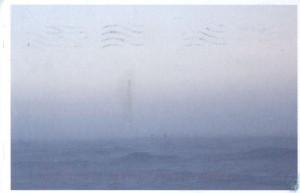 In all, I love the idea of literary postcards. I participate each year in the August Poetry Postcard Festival, and just hope that other participants are aware of how the poems are coming through at their final destination (I’ve received blank postcards, where it looks like someone put their poem on with tape or a sticker, and the postal sorting machines have ripped it off completely). While I have a great sense appreciation for the concept, the execution is sometimes a disappointment. [Pictured: Abe’s Penny Volume 3.2 – can’t tell who the artist is or title because that information was inked over by the post office stamp on the reverse side, whereas the art side got black and orange ink stamps and a brown smudge. To their credit, Abe’s Penny does post photo images of the content online, often inked and torn as well, but when I tried to find this particular card, the image online was different than the one I received.]
In all, I love the idea of literary postcards. I participate each year in the August Poetry Postcard Festival, and just hope that other participants are aware of how the poems are coming through at their final destination (I’ve received blank postcards, where it looks like someone put their poem on with tape or a sticker, and the postal sorting machines have ripped it off completely). While I have a great sense appreciation for the concept, the execution is sometimes a disappointment. [Pictured: Abe’s Penny Volume 3.2 – can’t tell who the artist is or title because that information was inked over by the post office stamp on the reverse side, whereas the art side got black and orange ink stamps and a brown smudge. To their credit, Abe’s Penny does post photo images of the content online, often inked and torn as well, but when I tried to find this particular card, the image online was different than the one I received.]
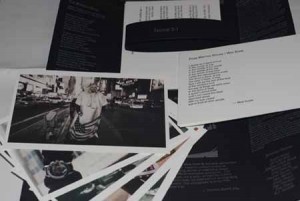 An alternative to actually receiving the individual cards sent in the mail is something like Tuesday: An Art Project, whose set of postcards come wrapped in a paper package with even more poems and information about the publication itself. This is a fun way to get the cards, read them, and then share them with others. Since only one poem or artwork featured on the picture side of the card, they are less likely to be damaged. They are also then each a piece suitable for framing vs. postcards that are art on one side and an author’s writing on the other. The quality of the paper and the letterpress printing and photo printing (rather than simple photocopies) also assure that these will be more likely to survive the postal gamut unscathed.
An alternative to actually receiving the individual cards sent in the mail is something like Tuesday: An Art Project, whose set of postcards come wrapped in a paper package with even more poems and information about the publication itself. This is a fun way to get the cards, read them, and then share them with others. Since only one poem or artwork featured on the picture side of the card, they are less likely to be damaged. They are also then each a piece suitable for framing vs. postcards that are art on one side and an author’s writing on the other. The quality of the paper and the letterpress printing and photo printing (rather than simple photocopies) also assure that these will be more likely to survive the postal gamut unscathed.
I’m all for postcard literature. With all our digital access, there’s still something fun and special about getting “real mail.” Each time I receive postcard lit, I read it – usually immediately, and then again later. It’s not the longer, sustained reading I most enjoy, but I do appreciate getting jolts of lit in my day. Just enough to remind me to take a deep breath and savor the moment.
Some postcard journals that I’m aware of:
Abe’s Penny
Hoot Review (forthcoming)
The Postcard Press
Ripples
If you know of or are a part of others, please let me know.
Spread the word!
New Lit on the Block :: Spittoon
Posted online and in a pdf version, Spittoon is an independent magazine of contemporary and experimental poetry, fiction, and creative nonfiction. Editors for this quarterly publication are Matt VanderMeulen (fiction), Kristin Abraham (poetry), and Berly Fields (creative nonfiction).
The inaugural issue of Spittoon features fiction by Wayne Lee Thomas, Ann Stewart, Sara Pritchard, Kyle Hemmings, William Haas, William J. Fedigan, Kirsten Beachy; poetry by Nate Pritts , Rich Murphy, Amanda McGuire, Kristi Maxwell, R.J. Ingram, Arpine Konyalian Grenier , Dana Curtis, Ryan Collins, Molly Brodak; and an interview with Arpine Konyalian Grenier.
Submissions are accepted year round with each piece published also automatically entered in the yearly “Best of Spittoon” awards.
Spread the word!
New Lit on the Block :: Adventum Magazine
 Adventum Magazine is a new online publication of, well, as Editor-in-Chief and Founder Naomi Mahala Farr muses in her philosophy – what could best be described as outdoor adventure writing. While other magazines exist that do honor the environment, the outdoors, and adventure, Naomi created Adventum to explore all of these in a more literary venue: creative nonfiction and haiku with photography and photo essays. The result is nothing short of breathtaking.
Adventum Magazine is a new online publication of, well, as Editor-in-Chief and Founder Naomi Mahala Farr muses in her philosophy – what could best be described as outdoor adventure writing. While other magazines exist that do honor the environment, the outdoors, and adventure, Naomi created Adventum to explore all of these in a more literary venue: creative nonfiction and haiku with photography and photo essays. The result is nothing short of breathtaking.
Produced in Issuu (print available on demand), the first installment of this biannual features essays by Adrianne Aron, Trevien Stanger, Manda Frederick, Kim Kircher, Kathleen Saville, Willard Manus, Cheryl Merrill, Tom Leskiw, Adrienne Ross Scanlan, Ed Gutierrez; photography by Shea Mack, Brandon Hauser, Jon Oliver-Hodges, Shaun Bevins, Tim Farr; and haiku by Dennis Maulsby, Sidney Bending, Julia Goodman, Wayne Lee, Wally Swist.
Submissions for the next issue are accepted until November 15. Adventum accepts “creative nonfiction, essays, and memoir pieces that explore some aspect of personal experience in the outdoors. This includes but is not limited to adventure in extreme wilderness landscapes as well as urban, whether it is about climbing trees, mountains or buildings, kayaking rivers or oceans, walking in pursuit of rare insects, pursuing the art of parkour, oceanic living, or mountain culture.” Photography and haiku (and haiku ONLY) are also accepted.
Spread the word!
What I’m Reading :: Dear Bully
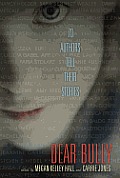 Note: If you don’t read all of this, read this much – Please buy a copy of this book and donate it to your local library and/or public school library. Kids need access to books like this to know they are not alone. (This is how I’d planned to end this post, but since not all readers will make it that far, I felt the need to start with it.)
Note: If you don’t read all of this, read this much – Please buy a copy of this book and donate it to your local library and/or public school library. Kids need access to books like this to know they are not alone. (This is how I’d planned to end this post, but since not all readers will make it that far, I felt the need to start with it.)
Dear Bully, edited by Megan Kelley Hall and Carrie Jones, is a collection of seventy stories from young adult authors recalling their own childhood experiences with bullying. The perspectives vary, from being an observer who does nothing to stop the incidents, to being the victim – most often feeling helpless, hopeless, but also angry and acting out – to being the perpetrator, a point of view least often explored, and, though with no means to excuse it, often revealing as much hopelessness and helplessness as the victims themselves.
With school gearing up, this book would make a incredible addition to any classroom – from middle school right on through college. This kind of text provides an extremely accessible approach to starting discussions about bullying. Without being preachy or mandating step-by-steps, these stories open the door to talking about what it’s like to be bullied and why it matters to have these conversations now. Who better to provide this to young adults but the young adult authors themselves, many of whose works may already be on the bookshelves in the classroom.
The book is divided into sections: Dear Bully; Just Kidding; Survival; Regret; Thank You Friends; Insight; Speak; Write It; and It Gets Better. The most heart wrenching for me was the Dear Bully section, in which authors write letters to the bullies of their pasts. All are from the perspective of the adult looking back, and these stories in particular seem to hit the strongest chord of showing just how long-lasting negative memories of bullying can be. For anyone who says, “It’s just kids being kids” and “They’ll get over it” – this section is for you.
There are also some fun and uplifting works – where friends stand by one another and stop their hurtful behavior, where the victim finds resolve and perseveres – and not just in adulthood, but then, there, in that moment of childhood. And of course, many, many of the stories show that, despite the bullying, despite feeling as a child that the world was going to end, all of these adults either say directly in their stories or show simply by their being included in this volume, that life does go on and there is more to life than just surviving. Of course, the best stories are the ones where the victims do see their bullies in adulthood and find that those ogres are just regular people – no longer larger than life, no longer commanding control of their universe. And the victims see that they themselves may actually have come out for the better in their lives. Maybe a bit of “vindication” – self-satisfying, but not without its truth.
This collection offers a delightful variety of writing styles – from the epistolary to the narrative – including diary entries, loads of character sketches (of course) and effective dialogue – both external and internal. There are song lyrics by Jessica Brody (with a link to hear the song online), an A-Z narrative (not quite an acrostic) by Laura Kasischke, a comic with story by Cecil Castellucci and illustrated by Lise Bernier, and another of my favorites, Sara Bennett Wealer writing to herself as a young girl with “stuff I wish someone would have told me when I was sixteen.” This should be required reading of ALL young girls (not to mention some adults).
The book includes two helpful sections: “Resources for Teens” and “Resources for Educators and Parents.” Dear Bully has a website that at the moment doesn’t have a whole lot to offer, mostly just media PR on the book, and a Facebook page where users post insightful, supportive, and helpful comments on bullying – what states and schools are doing, as well as personal commentary. A lot more going on here with 800+ likes.
With incidents of bullying – and the most insidious of all: cyberbullying – on the rise, this book comes into and can help start the conversation at the most opportune time. Dear Bully is for everyone who has grown up in this culture where bullying takes place every day, not just in the schools, but in our streets, in our homes, our place of work (and globally). Dear Bully unveils the truth of who we are as a community of people, and it’s not pretty. But until we recognize this, stop keeping it silent, and address it head-on, we’re doomed to continue forcing young people to have to “survive” their childhoods. It’s time to be the grown-ups we wish had stepped in to help us when we were young.
Spread the word!
Creative Resistance Fund
 The Creative Resistance Fund is intended for activists and culture workers in situations of distress as a result of their professional work. Distress situations may include verbal threats, imprisonment or legal persecution, violent attack, professional or social exclusion, or harassment.
The Creative Resistance Fund is intended for activists and culture workers in situations of distress as a result of their professional work. Distress situations may include verbal threats, imprisonment or legal persecution, violent attack, professional or social exclusion, or harassment.
The Creative Resistance Fund provides small distress grants to people in danger due to their use of creativity to fight injustice. The fund may be used to evacuate a dangerous situation; to cover living expenses while weighing long-term options for safety; or to act on a strategic opportunity to affect social change.
Spread the word!
Chattahoochee Review Welcomes New Eitors
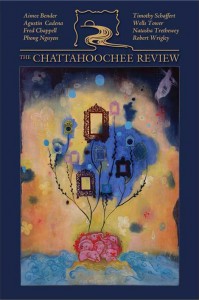 Now celebrating its 31st year in print, The Chattahoochee Review is under all new editorship: Editor Anna Schachner, Managing Editor Lydia Ship, Fiction Editor Andy Rogers, Nonfiction Editor Louise McKinney, Poetry Editor Michael Diebert; Art Editor Claire Paul, and Social Media Editor Michael Rowley.
Now celebrating its 31st year in print, The Chattahoochee Review is under all new editorship: Editor Anna Schachner, Managing Editor Lydia Ship, Fiction Editor Andy Rogers, Nonfiction Editor Louise McKinney, Poetry Editor Michael Diebert; Art Editor Claire Paul, and Social Media Editor Michael Rowley.
Managing Editor Lydia Ship writes: “Although our roots are in the South and we publish important writers such as William Gay, George Singleton, and Natasha Trethewey, we also publish writers from other regions of the U.S. and other countries such as Denmark, Mexico, Romania, and England. We are committed to exploring literature in translation and to writers who transgress borders, cultural and otherwise. While the Review features poetry, fiction, nonfiction, interviews, reviews, and occasional graphic work, we are also open to nontraditional forms. We value established writers but take great pride in discovering new voices. Work from The Chattahoochee Review is regularly featured in nationally published anthologies and books.”
The Chattahoochee Review is currently seeking poetry, fiction, and nonfiction for a special issue on Southern Literature to be published in late 2011, with a particular interested in writing that:
1. Challenges the traditional definition of “Southern”
2. Addresses the concerns of ethnicity in the South
3. Uses humor with originality and intelligence
4. Blends the gothic with other literary modes
5. Defies geography and the use of the vernacular as the only conditions of Southern identity
Spread the word!
New Lit on the Block :: TINGE Magazine
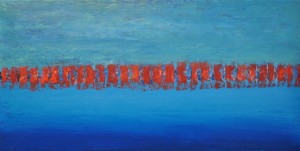 TINGE Magazine is Temple University’s new online literary journal, published twice a year, in the Spring (April) and in the Fall (December). The journal is edited by the graduate students of Temple’s M.F.A. Program in Creative Writing and has an open submissions policy.
TINGE Magazine is Temple University’s new online literary journal, published twice a year, in the Spring (April) and in the Fall (December). The journal is edited by the graduate students of Temple’s M.F.A. Program in Creative Writing and has an open submissions policy.
The first issue includes Fiction by Liam Callanan, Katherine Zlabek, Marc Schuster, Lauren Hopkins Karcz, V. Jo Hsu, and Mat Johnson; Poetry by Melissa Slayton, Michael S. Begnal, Christopher Schaeffer, George Eklund, Diana K. Lee, and Kristin Prevallet; Nonfiction by Michael Milburn; and Interviews with Kristin Prevallet and Mat Johnson.
Submissions for the next issue of TINGE Magazine will open September 1; submissions are accepted through Submishmash.
[Cover art by Brooke Lanier “Personal Best”]
Spread the word!
Alimentum Eat & Greet Tours
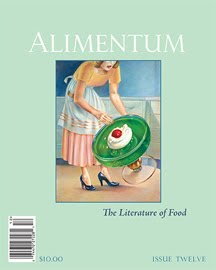 Alimentum: The Literature of Food offers Eat & Greet Food Tours – visiting cafes, bakeries, sample foods in restaurants, and visit markets. Registration is required.
Alimentum: The Literature of Food offers Eat & Greet Food Tours – visiting cafes, bakeries, sample foods in restaurants, and visit markets. Registration is required.
NASHVILLE
September 17th, 2011
Nolensville Pike
Tour runs from 9:30 am till 4 pm. Includes cafes of Istanbul to the authentic bakeries of Iraq, restaurant specialties: Ethiopian injera, Turkish stuffed grape leaves, Kurdish flatbread, Thai-style curry, authentic Mexican tacos, and learn from local market owners and restaurateurs about their native cuisine, and shop ethnic markets.
Tour Hosts: Alimentum Publisher Paulette Licitra & PR Director Annakate Tefft
Upcoming tours:
NASHVILLE October 22, 2011
Middle Tennessee Farm Tour
Tour Hosts Alimentum Publisher Paulette Licitra & PR Director Annakate Tefft
NYC November 5th, 2011
Bensonhurst-Gravesend Brooklyn – Southern Italian Cusiine & Culture
Tour Hosts Alimentum Publisher Paulette Licitra & Editor Esther Cohen
NYC November 6th, 2011
Elmhurst, Queens – Thai Cuisine & Culture
Tour Hosts Alimentum Publisher Paulette Licitra & Editor Esther Cohen
Spread the word!
Teaching 9/11
 The National Museum of American History will commemorate the tenth anniversary with an exhibit of objects recovered from the three sites attacked on September 11, 2001 – “Bearing Witness to History: Remembrance and Reflection.” Photographs with commentary on each object are available online as well as text and audio stories from the collection curators. A separate page of educational resources is available for teachers as well as a blog discussing such related issues as whether to teach the events of 9/11 as history or current events.
The National Museum of American History will commemorate the tenth anniversary with an exhibit of objects recovered from the three sites attacked on September 11, 2001 – “Bearing Witness to History: Remembrance and Reflection.” Photographs with commentary on each object are available online as well as text and audio stories from the collection curators. A separate page of educational resources is available for teachers as well as a blog discussing such related issues as whether to teach the events of 9/11 as history or current events.
Spread the word!
Narrative Spring 2011 Story Contest Winners
Narrative announces the winners and finalists of their 2011 Spring Story Contest:
FIRST PRIZE
Nickolas Butler, “Underneath the Bonfire”
SECOND PRIZE
Jan Ellison, “Second First Night”
THIRD PRIZE
Katie Cortese, “The Promised Land”
FINALISTS
Douglas Bauer
Wesley Brown
Leslie Ingham
Hannah Johnson
Jerry D. Mathes II
Lewis Moyse
Rina Piccolo
Rickey Pittman
Charlotte Price
Lynn Stegner
Spread the word!
Pongo Book & Writing Resources for Troubled Teens
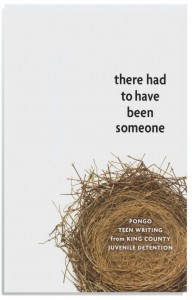 The Pongo Publishing Teen Writing Project is a volunteer, nonprofit effort with Seattle teens who are in jail, on the streets, or in other ways leading difficult lives. The Pongo website features many resources for teachers and counselors working with teen writers.
The Pongo Publishing Teen Writing Project is a volunteer, nonprofit effort with Seattle teens who are in jail, on the streets, or in other ways leading difficult lives. The Pongo website features many resources for teachers and counselors working with teen writers.
The Pongo Teen Writing Project is releasing their latest book of teen poetry from King County juvenile detention. This perfect binding, full-color cover book is entitled There Had to Have Been Someone. This and several other Pongo books are available for purchase on their web site, each with a sample poem that can be read online.
Pongo’s Writing Activities now includes an ‘easier to use’ interface for teens to write poetry online. There are 46 fill-in-the-blank writing activities on themes such as “Addicted,” “Girl with the Scars,” “Lessons of Courage and Fear,” and “Ten Reasons to Love Me.” The Home page has a video, set in juvenile detention, that explains Pongo’s mission and their authors’ poetry.
Spread the word!
New Re-Lit on the Block: The Public Domain Review
 Founded and edited by Jonathan Gray and Adam Green, The Public Domain Review was launched 1/1/11 to coincide with Public Domain Day celebrations around the world. The aspiration of The Public Domain Review is “to become a bounteous gateway into the whopping plenitude that is the public domain, helping our readers to explore this rich terrain by surfacing unusual and obscure works, and offering fresh reflections and unfamiliar angles on material which is more well known.”
Founded and edited by Jonathan Gray and Adam Green, The Public Domain Review was launched 1/1/11 to coincide with Public Domain Day celebrations around the world. The aspiration of The Public Domain Review is “to become a bounteous gateway into the whopping plenitude that is the public domain, helping our readers to explore this rich terrain by surfacing unusual and obscure works, and offering fresh reflections and unfamiliar angles on material which is more well known.”
Each week an invited contributor presents an interesting or curious work with a brief accompanying text giving context, commentary and criticism. Contributors include scholars, writers, critics, artists, archivists, scientists and librarians. is also now accepting open submissions.
In addition to the articles, The Public Domain Review has begun collections of public domain films, audio, images and texts.
The review is a project of the Open Knowledge Foundation (a not-for-profit organization) and is made possible by funding from the Shuttleworth Foundation.
Spread the word!
American Masculine: Stories
Winner of the Bread Loaf Writers’ Conference Bakeless Prize, Shann Ray’s volume of short fiction features ten stories of the American West. Focused, as the title implies, on the question of what it means to be a man, the stories delve into relationships, substance abuse, and parenting. Hovering right underneath—and often entwined with—the question of masculinity is the question of racial identity: most of Ray’s stories feature Native Americans struggling with their identity (whether in the white world or within their own culture), or white Americans making their way in the Native world. Continue reading “American Masculine: Stories”
Spread the word!
The Disinformation Phase
In “Carbon-Based Lifeform Blues,” Chris Toll writes, “The job of poets is not to explain the Mystery. / The job of poets is to make the Mystery greater”—which is precisely what Toll accomplishes in his new collection of poems. The Disinformation Phase brings together 50 poems—including some “translations”—that, though economic in language, are wide in scope, expansive in imagination, and linguistically playful. Divided into three sections whose titles exemplify the playfulness (“The Ritual in Spiritual,” “The We in Weep,” and “The Ion in Redemption”), the book consists of short, concise poems where inanimate objects are capable of action and emotion, as seen in the opening poem, “Insulator Drive Blues”: Continue reading “The Disinformation Phase”
Spread the word!
Rise of the Ranges of Light
From a long tradition of nature writing that intermingles reflection and poetic descriptive prose with an ability to recount minute detail, David Scott Gilligan’s newest chronicle illuminates the California landscape. Gilligan juxtaposes first-person narrative with clear science writing as he explains geologic activity, volcanoes, and evolution, all focused on the diverse landscape of California mountain ranges. Following in John Muir’s footsteps, Gilligan endeavors to capture his personal connection to the landscape by employing stunning language to bring the Sierra Nevada to the reader. Continue reading “Rise of the Ranges of Light”
Spread the word!
Four of a Kind
Here are four reasons to read Mark Neely’s chapbook Four of A Kind, winner of the 2009 Concrete Wolf Chapbook Competition: Continue reading “Four of a Kind”
Spread the word!
How Phenomena Appear to Unfold
Longtime readers of Leslie Scalapino’s poetry and writings will appreciate this expansion of How Phenomena Appear to Unfold, a collection of some of Scalapino’s poetry as well as extensive coverage of her essays and critical writing. Scalapino’s contributions to poetics are extensive, as she explores the methods and theory of the avant-garde, writing on poets such as H.D., Lyn Heijinian, and Philip Whalen. For the poet or poetry lover who wants to further explore or add to their collection of writing concerning the avant-garde, this compilation will provide much context and critical inquiry into poetical debates still relevant today. As Scalapino claims herself in the introduction to the collection, “all of the essays, fictions, poems, and poem-plays, demonstration and examination of each other in a stream of comparisons, are tied to that concept…as also to the notion—a corollary/as the act of incorporating—of the outside and inside simultaneously creating each other.” Each work echoes off of the other, further creating that effect with each read. Continue reading “How Phenomena Appear to Unfold”
Spread the word!
The Firestorm
In The Firestorm, Zach Savich urges the reader along through the unknowable, manifested frequently in the whims of both the literal and human atmospheres, and resulting in the ultimate questioning of a belief in anything. A series of Savich’s poems, all beginning “I suppose I do believe in nothing,” highlight the paradoxical and infinitely regressive nature of belief. In “Silent Film,” Savich again forces us to examine our preconceptions of belief, writing, “The heart by definition the one thing we have not defined.” Continue reading “The Firestorm”
Spread the word!
xicano duende
In his introduction to this selection, editor and scholar Rigoberto González, after interrogating two previous “popular readings” of alurista’s work (note: throughout this review I am respectfully and enthusiastically attending to the poet’s own refusal to capitalize proper nouns) which define it both as “experimental” and “radiat[ing] from an Amerindian consciousness,” declares alurista to be a “political poet.” González is really doing nothing more than extrapolating upon merging the two readings together as one and expanding the argument for the notable worth of alurista’s work, but his point nonetheless is well taken. Continue reading “xicano duende”
Spread the word!
the Orange Suitcase
In a collection that falls somewhere between linked short stories and poetic reflections, Joseph Riippi explores, through the words and story of a young man who shares his name, the strangeness of knowing so much about someone but also not knowing them at all—which is in a way true of so many relationships. Continue reading “the Orange Suitcase”
Spread the word!
This New & Poisonous Air
Judging by the expression of the startled damsel on the cover of This New & Poisonous Air, some things are best left alone. But what purpose does that really serve? There would be no experience. No meaning. It is the unknown’s transformation into a difficult reality that Adam McOmber explores in his strong collection of stories. Continue reading “This New & Poisonous Air”
Spread the word!
Never Any End to Paris
Spanish novelist Enrique Vila-Matas takes his title Never Any End to Paris from Hemingway’s A Moveable Feast. But whereas Hemingway was poor but happy in Paris, the narrator says of his two years as a young man in the 1970s, “I went to Paris and was very poor and very unhappy.” Although the narrator (a stand-in for the author) uses his early life in a Paris garret to give a three-day lecture, for the most part this novel feels more like a fictionalized memoir than a lecture. The narrative shows the intellectual life of the times with famous and not so famous writers and eccentrics. It also reviews approaches to writing, since the narrator asks advice while writing his first novel. And irony figures in this account with Vila-Matas’ erudite wit and keen eye for absurdity or the ridiculous. It even appears with the narrator’s not understanding irony: “irony is the highest form of sincerity.” Continue reading “Never Any End to Paris”
Spread the word!
Notes from Irrelevance
Anselm Berrigan’s new book Notes from Irrelevance opens with a simple declarative idea: “I came.” But what precedes that phrase gives a better sense of what a reader can expect from this long poem: Continue reading “Notes from Irrelevance”
Spread the word!
Wait
The title of Alison Stine’s collection Wait—and the repetition of this word in its multitudinous forms throughout the work—suggests a passivity and loss or relinquishment of control, which seem to be the driving force behind much of the book’s thematic content. Wait presents itself from an almost stark, feminine—if not feminist—perspective, with subjects who are distant and passive, but not without some veiled level of control. This power is deployed, among other means, through the forcefulness and tight control of the poet’s language, in sharply crafted poems which alternate between small consistent selections of loose forms. In one line alone, the talented Stine has the power to simultaneously wax nostalgic about a carefree, country childhood and come down critically on misogyny and the notion of the patriarchy. Continue reading “Wait”
Spread the word!
Handmade Love
Julie Enszer’s first book of poetry, Handmade Love, embodies the political in a sensual context. This book, printed in a lovely 4×6 format by A Midsummer Night’s Press, centers on themes of relationships, including lesbian marriage and friendships. Continue reading “Handmade Love”
Spread the word!
A Real Life
In Ferenc Máté’s new book A Real Life, he asserts that what truly matters are family, good friends, and a true community. This is a telling indicator of his audience; people attracted to this book will relish their old-fashioned values being confirmed. Hence, Máté will be preaching to the already converted—unfortunately, because others should read this book to implement changes in our society. But even the already converted will find this book (termed a memoir by the publisher) fresh, given Máté’s examples, humor, quotable insights, and appropriate research. Continue reading “A Real Life”
Spread the word!
Updates to NewPages Guides :: August 31, 2011
Added to The NewPages Big List of Literary Magazines:
Assisi [O] essays, fiction, poetry, photography, art
The Muse [O] poetry, scholarly research, essay, interview, book reviews
The Washington Pastime [O] poetry, fiction, nonfiction
mgversion2>datura [O] English/French poetry, fiction, nonfiction, essay, art, photography
Anobium  poetry, prose
poetry, prose
The Raintown Review  poetry, literary criticism, interviews, translations
poetry, literary criticism, interviews, translations
Grasslimb  poetry, prose, line art, cartoons, reviews
poetry, prose, line art, cartoons, reviews
Voices de la Luna  poetry, prose, graphic art
poetry, prose, graphic art
Mixed Fruit [O] poetry, fiction, creative nonfiction, translations, art
YB Poetry [O] poetry, reviews
Trans-Portal [O] essay, creative non-fiction, reviews
Sleepingfish [O]
Amethyst Arsenic [O] poetry
Edge Piece [O] fiction, non-fiction, poetry, reviews, art
Global Graffiti
In The Snake Magazine [O] fiction
Specter [O] poetry, fiction, creative nonfiction, flash fiction
Lishnu [O] haikai, translation
Black Magnolias  poetry, fiction, prose
poetry, fiction, prose
Moonshot  poetry, fiction, comics, arts
poetry, fiction, comics, arts
Structo  poetry, fiction, essays, interviews
poetry, fiction, essays, interviews
[O] = mainly online  = mainly print
= mainly print
Added toThe NewPages List of Literary Websites:
Turks Head Review – fiction, nonfiction, poetry, art, music, video
Northern Poetry Review – poetry, interviews, reviews (Canada)
bioStories – nonfiction, essays
Symmetry Pebbles – poetry
Staccato Fiction – microfiction
Weekly Hubris – Progressive International Commentary
Apropos Literary Journal
Kweli Journal – fiction, nonfiction, poetry, photography, interview
The New Verse News – poetry
Added to The NewPages List of Independent Publishers & University Presses:
Wordrunner Electronic Chapbooks – poetry, memoir, short story, e-chapbooks
Wolverine Farm Publishing
Kattywompus Press – poetry, fiction, nonfiction, chapbooks, artist’s books
Blacksmith Books [Hong Kong] – East Asian nonfiction, photography
Added to The NewPages Big List of Alternative Magazines:
Metta-Physics [O] exploring the science-spirituality interface
ARC  Caribbean art and culture
Caribbean art and culture
Added to The NewPages List of Writing Conferences, Workshops, Retreats, Centers, Residencies & Book & Literary Festivals:
Limestone Dust Poetry Festival (Huntsville, AL)
Las Dos Brujas Writers’ Workshops
Please see the NewPages FAQ for information about being listed in one of our guides.
Spread the word!
New Lit on the Block :: EdgePiece
 Founded by Sarah Lindsay to “give new writers and artists a place to start – an edge piece for their big-picture puzzle,” EdgePiece will publish online tri-annually. Joining in this effort are Developmental Editors Sarah Lucas, Max Pickering, Pamela S. Wall, Dakota Morgan and Copy Editor Pamela S. Wall. Together, the unique promise of this publication is to “never fully reject a manuscript; we work with you, editing your piece and suggesting improvements. This way, everyone gets experience and satisfaction from the process.”
Founded by Sarah Lindsay to “give new writers and artists a place to start – an edge piece for their big-picture puzzle,” EdgePiece will publish online tri-annually. Joining in this effort are Developmental Editors Sarah Lucas, Max Pickering, Pamela S. Wall, Dakota Morgan and Copy Editor Pamela S. Wall. Together, the unique promise of this publication is to “never fully reject a manuscript; we work with you, editing your piece and suggesting improvements. This way, everyone gets experience and satisfaction from the process.”
Featured in Issue 1.1 is Fiction by George Masters, Elizabeth Dunphey, Tim Martin, Nana Adjei-Brenyah, and Bob Kalkreuter; Non-Fiction by Katie Liming, and Kendra Shirey; Poetry by, Catherine Batsios, Alana Aguilar, Thommie Gillow, Paige Webb, Nico Mara-McKay, and Amanda Montell; Photography by, Kendra Shirey, Vanessa Levin-Pompetzki, and Keith Moul.
EdgePiece is “hungry for fiction, non-fiction and poetry” but will also consider book/essay/poetry/film reviews, photography, and other graphic/visual art.
Spread the word!
Bacopa 2011 Literary Review Prizes
 The newest edition of Bacopa: A Literary Review from the Writers Alliance of GAinesville, includes the winners of the 2011 Bacopa Genre Awards:
The newest edition of Bacopa: A Literary Review from the Writers Alliance of GAinesville, includes the winners of the 2011 Bacopa Genre Awards:
Fiction
1st JoeAnn Hart, “Open House”
2nd Mandy Manning, “Growth”
Honorable Mention Q. Lindsey Barrett “Toro-nado”
Nonfiction
1st Amanda Skelton, “Warding off the Monkey”
2nd Carolyne Wright, “Los Olvidados: The Forgotten Ones”
Honorable Mention Ed McCourt, “Watching Rocco”
Poetry
1st Colleen Runyan, “me or the tea”
2nd Erika Brumett, “Fight Overheard in Sign Language”
Honorable Mention Carolyne Wright, “Acrostic: Evcharistoic Eulene”
Spread the word!
New Lit on the Block :: Amethyst Arsenic
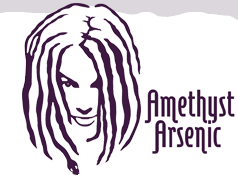 Based out of Somerville, Mass, Amethyst Arsenic publishes “all forms of poetry from new and established voices” as well as art. Edited and published by Samantha Milowsky with copy editing by Kasandra Larson and design by Emily Crandall, Amethyst Arsenic will appear at least twice a year, regularly offering opportunities for guest editors.
Based out of Somerville, Mass, Amethyst Arsenic publishes “all forms of poetry from new and established voices” as well as art. Edited and published by Samantha Milowsky with copy editing by Kasandra Larson and design by Emily Crandall, Amethyst Arsenic will appear at least twice a year, regularly offering opportunities for guest editors.
Issue 1.1 (Summer 2011) with Guest Editors Lucie Monroe, Michael Gill includes works by Brandon Amico, Rusty Barnes, Gale Batchelder, Cassandra Clarke, Jim Cronin, Gregory Crosby, Judson Evans, Reinhard G
Spread the word!
Mental Shoes Will Knock Yer Socks Off
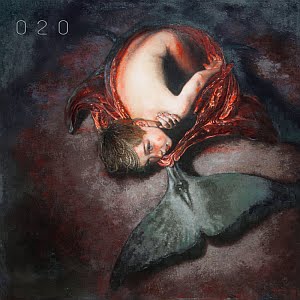 Mental Shoes: Footwear and the life of the mind is an online publication of “arts and ideas” – which includes fiction and viso-writing. Each issue downloads as a pdf.
Mental Shoes: Footwear and the life of the mind is an online publication of “arts and ideas” – which includes fiction and viso-writing. Each issue downloads as a pdf.
The current issue (shown) is 300 pages – takes a while to download – but completely worth it (as are the previous issues – some shorter and quicker to download).
Especially worth the wait is “Mississippi Beaches: One Year After the BP Oil Spill” – a series of photographs by Julie Dermansky – a poignant reminder of how “clean up” does not equate to cleaned up.
Spread the word!
New Lit on the Block :: Specter Literary Magazine
 The two founders of Specter Literary Magazine – husband & wife, mensah demary & Athena Dixon-DeMary, prose writer & poet respectively – take the Gen Y labels, embrace them, and consider them as the very complexity that writers regularly address: “Are we all frightened, passive, coddled? Are we all spoiled & flighty? Do we all dream? If Generation Y is so different from our parents and grandparents, then what does it mean to: love today; raise children today; keep religious faith today? The work some might consider ‘navel-gazing’ and ‘postmodern’ and ‘boring?’ We want that work. Writers who believe literature can reveal and–dare we say–save the world? We want those writers. We want dreamers.”
The two founders of Specter Literary Magazine – husband & wife, mensah demary & Athena Dixon-DeMary, prose writer & poet respectively – take the Gen Y labels, embrace them, and consider them as the very complexity that writers regularly address: “Are we all frightened, passive, coddled? Are we all spoiled & flighty? Do we all dream? If Generation Y is so different from our parents and grandparents, then what does it mean to: love today; raise children today; keep religious faith today? The work some might consider ‘navel-gazing’ and ‘postmodern’ and ‘boring?’ We want that work. Writers who believe literature can reveal and–dare we say–save the world? We want those writers. We want dreamers.”
Published online, the first issue of Specter, launched at the end of July, features works by Mick Davidson, Lois Harrod, J. Bradley, Noriki Nakada, Bradley Warshauer, Jasmon Drain, Chris Castle, and Tom Sheehan.
Specter accepts poetry, fiction, creative nonfiction and flash via Submishmash.
Spread the word!
Alimentum – Summer 2011
Admittedly, I was smitten with the idea behind this summer’s issue of Alimentum long before I’d had the opportunity to read it. This biannual literary journal, which dedicates itself to the subject of food, has gathered together work for its twelfth issue with a focus on food memories. Whether they are good—that first icy Bombpop of summer—or perhaps, not so good—think glace fish mold—we all have them. The editors at Alimentum have chosen carefully its ensemble of voices for this issue. Collectively, they offer up a very soulful celebration of first foods. Continue reading “Alimentum – Summer 2011”
Spread the word!
The American Poetry Review – May/June 2011
The American Poetry Review is an old school classic. Like the New York Review of Books, its large, newspaper sheets enchant readers who nostalgically yearn for the days of yore before Wasteland iPad apps and “liking” poems on Facebook (or the social media engine of your choice). This is not to say that APR is a musty old rag littered with obscure and dank Poundian cantos. Intriguing interviews and poetry grace its pages. Continue reading “The American Poetry Review – May/June 2011”
